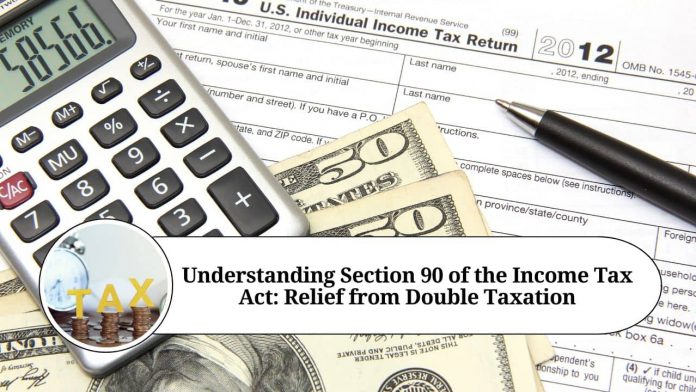Section 90 of the Income Tax Act provides relief from double taxation to taxpayers who earn income from foreign sources. It enables them to claim relief from tax paid in a foreign country against the tax payable in India. This provision aims to encourage cross-border trade and investment by eliminating the burden of double taxation.
Meaning of Double Taxation:
Double taxation occurs when the same income is taxed twice, once in the country where it is earned and again in the country where it is received. This can happen in cases where a person is a resident of one country but earns income from another country. The result is that the taxpayer ends up paying taxes on the same income twice.
Provisions of Section 90: Section 90 of the Income Tax Act provides relief from double taxation in the following ways:
- Understanding Section 90 of the Income Tax Act: Relief from Double Taxation India has entered into DTAA with various countries to avoid double taxation. If a taxpayer is a resident of a country with which India has entered into a DTAA, he can claim relief under the provisions of the agreement. The relief can be in the form of exemption or deduction from tax, or tax credit for the amount of tax paid in the foreign country.
- Relief for Unilateral Relief: In the absence of a DTAA, a taxpayer can claim relief under the provisions of Section 91 of the Income Tax Act. This is called unilateral relief. The relief can be in the form of exemption or deduction from tax, or tax credit for the amount of tax paid in the foreign country.
- Procedure for Claiming Relief: To claim relief under Section 90 or Section 91, a taxpayer needs to submit an application to the Assessing Officer (AO) along with the necessary documents. The documents include a certificate of residence from the foreign country, a copy of the tax return filed in the foreign country, and proof of tax paid in the foreign country.
- Time Limit for Claiming Relief: The application for relief under Section 90 or Section 91 needs to be submitted within the prescribed time limit. The time limit is usually within the time allowed for filing the tax return or before the completion of the assessment, whichever is earlier.
- Relief for Non-Residents: Section 90 also provides relief to non-residents who earn income from India. Non-residents can claim relief under the provisions of DTAA or unilateral relief.
Case Studies: Let’s consider two examples to understand the provisions of Section 90 in a better way.
Example 1: Mr. A is a resident of India and earns income from the USA. He pays tax on his income in the USA. As India has a DTAA with the USA, Mr. A can claim relief under the provisions of the agreement. He can claim a tax credit for the amount of tax paid in the USA against the tax payable in India.
Example 2: Mr. B is a resident of India and earns income from a country with which India has not entered into a DTAA. In this case, Mr. B can claim relief under the provisions of Section 91 of the Income Tax Act. He can claim a tax credit for the amount of tax paid in the foreign country against the tax payable in India.
Other Useful Links:
Conclusion:
In conclusion, Section 90 of the Income Tax Act provides relief from double taxation to taxpayers who earn income from foreign sources. The provisions of this section aim to promote cross-border trade and investment by eliminating the burden of double taxation. Taxpayers should ensure that they comply with the requirements of the section while claiming relief to avoid any penalties or consequences. By understanding the provisions of Section 90, taxpayers can make informed decisions about their foreign income and investments.
Frequently Asked Questions:
Q: What is Section 90 of the Income Tax Act?
A: Section 90 of the Income Tax Act, of 1961 provides relief to taxpayers from double taxation, which occurs when the same income is taxed twice in two different countries.
Q: Who can claim relief under Section 90 of the Income Tax Act?
A: Any resident taxpayer who has paid taxes on the same income in another country can claim relief under Section 90.
Q: What is the procedure for claiming relief under Section 90 of the Income Tax Act?
A: The taxpayer must file a claim for relief with the Income Tax Department along with necessary documents such as the tax paid in the other country, proof of residency, and proof of income earned in the other country.
Q: How much relief can be claimed under Section 90 of the Income Tax Act?
A: The relief is typically the lower of the tax paid in the other country or the tax liability in India on the same income.
Q: Is relief under Section 90 automatic or does the taxpayer need to apply for it?
A: The taxpayer needs to apply for relief under Section 90. It is not granted automatically.
Q: Is there a time limit for claiming relief under Section 90 of the Income Tax Act?
A: Yes, the claim for relief must be made within the time allowed for filing the income tax return for the relevant assessment year.
Q: Can the relief be claimed under Section 90 if the other country does not have a tax treaty with India?
A: No, relief can only be claimed if there is a tax treaty between India and the other country.
Q: What is a tax treaty?
A: A tax treaty is an agreement between two countries that sets out the rules for how income earned by residents of one country will be taxed in the other country.
Q: How many tax treaties does India have with other countries?
A: India has tax treaties with over 90 countries.




















